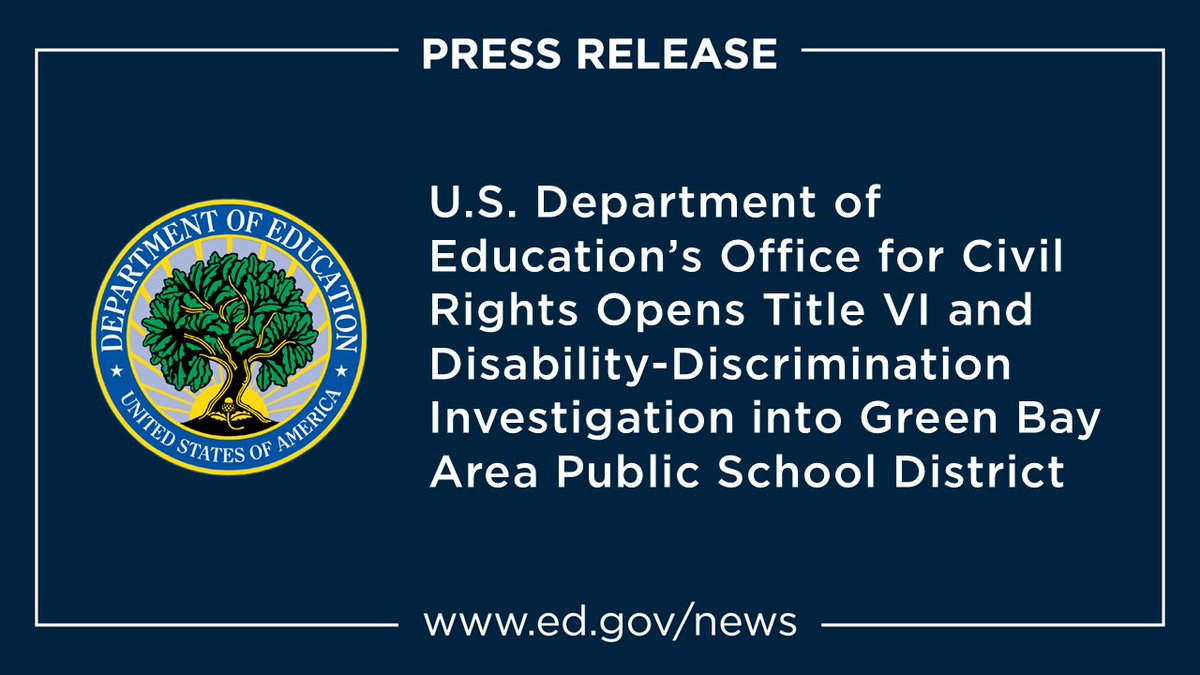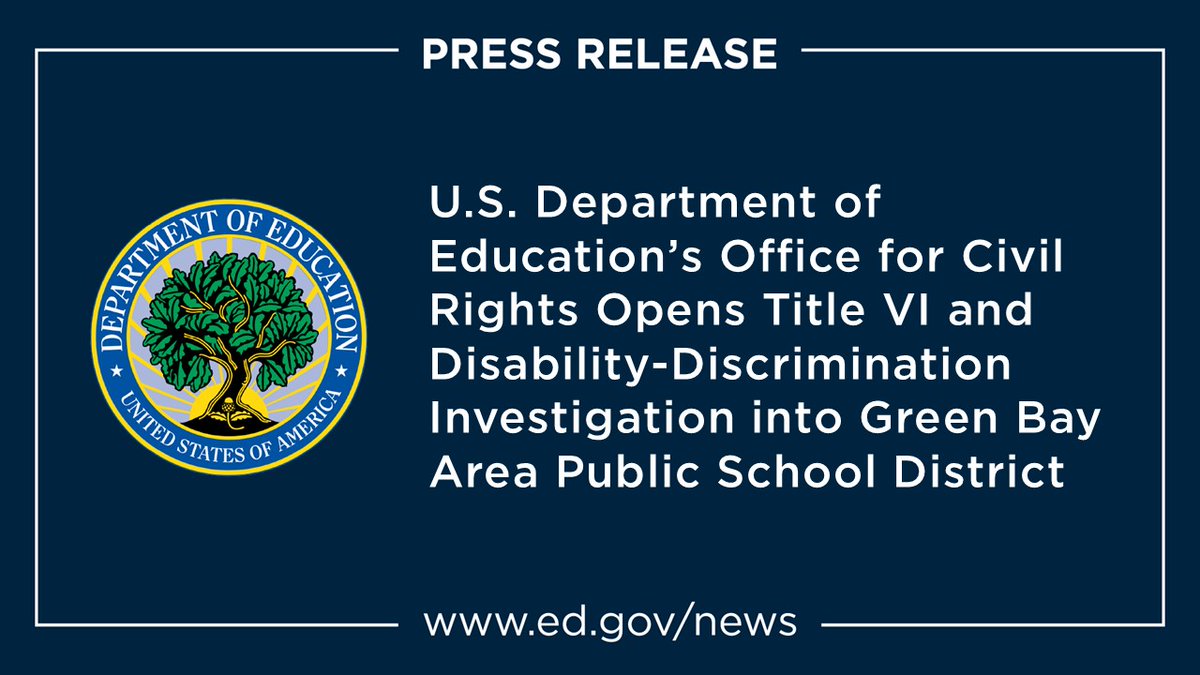ED’s Office Probes Green Bay Schools for Racial Bias in Services!
Title VI and Disability Discrimination investigation into Green Bay Area Public School District
In a significant development for educational equity, the U.S. Department of Education’s Office for Civil Rights has initiated an investigation into the Green Bay Area Public School District in Wisconsin. This investigation centers on allegations of violations of Title VI of the Civil Rights Act and disability discrimination. The focus of the inquiry is the claim that the district may have prioritized special education services based on racial "priority groups," thus potentially undermining the rights of students with disabilities and those from racially marginalized backgrounds.
Understanding Title VI and Its Implications
Title VI of the Civil Rights Act prohibits discrimination based on race, color, or national origin in programs and activities receiving federal financial assistance. This law is crucial for ensuring that all students have equal access to educational opportunities, regardless of their racial or ethnic background. The allegations against the Green Bay Area Public School District suggest that certain racial groups may have been unfairly prioritized when it comes to receiving special education services, raising serious concerns about equity and fairness in educational practices.
The Role of the Office for Civil Rights
The Office for Civil Rights (OCR) within the U.S. Department of Education is responsible for enforcing federal civil rights laws in education. Its mission includes ensuring that all students have access to a high-quality education free from discrimination. The initiation of this investigation indicates that the OCR is taking these allegations seriously and is committed to examining the practices of the Green Bay Area Public School District.
Context of the Investigation
The Green Bay Area Public School District serves a diverse student population, and the allegations arise in a broader context of ongoing discussions about racial equity in education across the United States. Disparities in educational resources and opportunities for students with disabilities and those from minority backgrounds are longstanding issues. The investigation into the Green Bay district reflects heightened scrutiny of how schools allocate resources and services, particularly in special education.
- YOU MAY ALSO LIKE TO WATCH THIS TRENDING STORY ON YOUTUBE. Waverly Hills Hospital's Horror Story: The Most Haunted Room 502
The Importance of Special Education Services
Special education services are essential for meeting the needs of students with disabilities. These services are designed to provide personalized support that enables students to thrive academically and socially. When these services are not distributed equitably, it can lead to significant disadvantages for certain groups of students. The allegations against the Green Bay Area Public School District highlight the critical need for transparency and fairness in how special education services are provided.
Potential Outcomes of the Investigation
The outcome of the OCR’s investigation could have far-reaching implications for the Green Bay Area Public School District and beyond. If the investigation finds evidence of discrimination, the district may be required to implement corrective actions to ensure compliance with Title VI and improve its practices related to special education. This could include changes to how services are allocated, enhanced training for staff on equity issues, and increased efforts to engage with families and communities.
Community Response and Engagement
The initiation of this investigation has sparked conversations among parents, educators, and community members in the Green Bay area. Many are expressing concern about the potential implications of the allegations and the importance of ensuring that all students receive the support they need. Community engagement will be crucial as the district navigates this investigation and works toward fostering an inclusive educational environment.
The Broader Implications for Education Equity
This investigation into the Green Bay Area Public School District is part of a larger national conversation about education equity. Across the United States, schools are grappling with how to provide equitable access to resources and opportunities for all students, particularly those from historically marginalized groups. The scrutiny of the Green Bay district’s practices underscores the need for ongoing vigilance and advocacy in the pursuit of educational equity.
Conclusion
The investigation into the Green Bay Area Public School District by the Office for Civil Rights is a critical step in addressing allegations of racial and disability discrimination in special education services. As the situation unfolds, it will be essential for all stakeholders to remain engaged and committed to ensuring that every student has access to the educational support they need to succeed. This investigation serves as a reminder of the importance of equity in education and the ongoing work required to achieve it.
By prioritizing transparency, community engagement, and adherence to civil rights laws, the Green Bay Area Public School District can work toward creating a more equitable educational environment for all students, regardless of their race or disability status. The outcome of this investigation may not only impact the local district but also set a precedent for how similar cases are handled across the country, making it an essential event to watch in the ongoing fight for educational equity.

ED’s Office for Civil Rights has opened a Title VI & disability-discrimination investigation into the Green Bay Area Public School District in Wisconsin, alleging the district prioritized special education services based on racial “priority groups.” https://t.co/o8Rptmua6w pic.twitter.com/butpOjsbHs
— U.S. Department of Education (@usedgov) May 28, 2025
ED’s Office for Civil Rights has opened a Title VI & disability-discrimination investigation into the Green Bay Area Public School District in Wisconsin, alleging the district prioritized special education services based on racial “priority groups.”
In a recent development that has caught the attention of many, the U.S. Department of Education’s Office for Civil Rights has initiated an investigation into the Green Bay Area Public School District. The focus of this inquiry is serious: allegations that the district may have improperly prioritized special education services based on racial “priority groups.” This situation raises significant questions about equity and fairness in educational opportunities for all students, particularly those with disabilities.
Understanding Title VI and Disability Discrimination
Before diving deeper into this investigation, it’s crucial to understand what Title VI and disability discrimination entail. Title VI of the Civil Rights Act of 1964 prohibits discrimination on the basis of race, color, or national origin in programs and activities receiving federal financial assistance. Essentially, it’s designed to ensure that no one is denied access to educational resources due to their race.
On the other hand, disability discrimination refers to the unfair treatment of individuals based on their disabilities. Under the Individuals with Disabilities Education Act (IDEA), students with disabilities are entitled to a free appropriate public education (FAPE) tailored to their unique needs. When schools prioritize services based on racial categories, they risk violating these critical protections.
The Allegations Against Green Bay Area Public School District
The heart of the investigation revolves around the allegations that the Green Bay Area Public School District has created a system where access to special education services is determined by racial classifications. This notion of prioritizing students based on their race is not only controversial but also potentially illegal under federal law.
The implications of this investigation are profound. If the allegations prove true, it raises serious concerns about how education is administered in the district. Are all students receiving the support they need? Are certain groups being marginalized while others are prioritized? These questions are vital for parents, educators, and the community at large.
The Broader Context of Education Equity
Education equity is a hot-button issue in the United States. Many schools across the country face challenges related to resource allocation, particularly for special education programs. The idea that some students might receive preferential treatment based on race only adds fuel to an already contentious debate.
This situation in Green Bay is not isolated. Across the nation, many school districts grapple with similar issues. The challenge lies in ensuring that every student, regardless of their background or needs, has access to quality education and necessary services. As we look at systems that are meant to support vulnerable populations, it becomes clear that fairness must be at the forefront.
The Role of Parents and the Community
Parents, guardians, and community members play a crucial role in advocating for their children’s rights, especially when it comes to education. In light of these allegations against the Green Bay Area Public School District, it’s a pivotal moment for families to engage with school boards and district officials.
When parents advocate for their children, they help ensure that all students receive the services they are entitled to. Community engagement can lead to more transparency and accountability within school systems. By asking questions, attending meetings, and raising concerns, families can help shape a more equitable educational landscape.
What’s Next for the Investigation?
As the investigation unfolds, many are left wondering what the next steps will be for the Green Bay Area Public School District. The U.S. Department of Education will conduct a thorough review of the district’s policies and practices regarding special education services. This may involve interviews with school officials, parents, and possibly students.
The outcome of this investigation could lead to significant changes in how the district operates. If violations are found, the school may be required to implement corrective actions, which could include revising policies, providing additional training for staff, or even reforming how special education services are allocated.
The Importance of Awareness and Advocacy
Raising awareness about issues of discrimination in education is vital. Sharing information about cases like the one involving the Green Bay Area Public School District can help others understand the complexities of education equity.
Advocacy extends beyond just awareness; it involves taking action. Whether that means joining local advocacy groups, reaching out to policymakers, or volunteering in schools, every effort counts in the fight for equal access to education.
Conclusion: A Call to Action
The investigation into the Green Bay Area Public School District serves as a reminder of the ongoing challenges related to race and disability in education. As members of the community, it’s essential to stay informed and engaged. We must work collectively to ensure that all students have access to the resources they need, regardless of their race or disability status.
For parents and community members in Green Bay, this is an opportunity to push for changes that promote fairness and equity in education. Being proactive can make a difference in the lives of children who rely on these critical services.
The outcome of this investigation will not only impact the Green Bay Area Public School District but may also set a precedent for how similar issues are handled in other school districts across the country. Let’s hope for a resolution that prioritizes the needs of all students and upholds the principles of equality in education.

